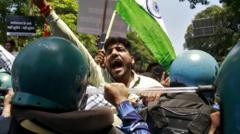The Kashmir region has descended into chaos following the tragic attack near Pahalgam, which has provoked a cascade of retaliatory measures. In the immediate aftermath, Pakistan's National Security Committee declared an immediate visa suspension for Indian citizens and initiated the expulsion of Indian diplomats stationed in Islamabad.
Indian police attribute the brutal shooting to suspects linked to the Pakistan-based militant group, Lashkar-e-Taiba (LeT). The attackers, consisting of two Pakistani citizens and a local, remain unrepentant, and Islamabad categorically denies involvement, criticizing India's claims as unfounded.
The Indian Prime Minister Narendra Modi has retaliated with a vow to track down those responsible for the attack, pledging rigorous action against both the perpetrators and their supporters. Following this, India has announced its own set of diplomatic responses, including the closure of the Attari-Wagah border and the cessation of visa services for Pakistani nationals.
Further strain is evident as Pakistan rejected India's unilateral suspension of the Indus Water Treaty, labeling any obstruction of water flow a consequential Act of War. Pakistan has enacted comprehensive measures, such as barring Indian airlines from its airspace and reducing its diplomatic presence in India.
As investigations unfold, Indian authorities have detained approximately 1,500 individuals to gather information about the attackers, amid concerns of retribution against the Kashmiri community within India. Reports of harassment targeting Kashmiri students have surfaced, alongside emotional farewells to the victims from mourning families across the nation.
While business and schools in the region begin to reopen, the aftermath of the deadly attack continues to cast a pall over Kashmir, where citizens are living in fear amidst heightened military presence and escalating tensions.
Indian police attribute the brutal shooting to suspects linked to the Pakistan-based militant group, Lashkar-e-Taiba (LeT). The attackers, consisting of two Pakistani citizens and a local, remain unrepentant, and Islamabad categorically denies involvement, criticizing India's claims as unfounded.
The Indian Prime Minister Narendra Modi has retaliated with a vow to track down those responsible for the attack, pledging rigorous action against both the perpetrators and their supporters. Following this, India has announced its own set of diplomatic responses, including the closure of the Attari-Wagah border and the cessation of visa services for Pakistani nationals.
Further strain is evident as Pakistan rejected India's unilateral suspension of the Indus Water Treaty, labeling any obstruction of water flow a consequential Act of War. Pakistan has enacted comprehensive measures, such as barring Indian airlines from its airspace and reducing its diplomatic presence in India.
As investigations unfold, Indian authorities have detained approximately 1,500 individuals to gather information about the attackers, amid concerns of retribution against the Kashmiri community within India. Reports of harassment targeting Kashmiri students have surfaced, alongside emotional farewells to the victims from mourning families across the nation.
While business and schools in the region begin to reopen, the aftermath of the deadly attack continues to cast a pall over Kashmir, where citizens are living in fear amidst heightened military presence and escalating tensions.

















